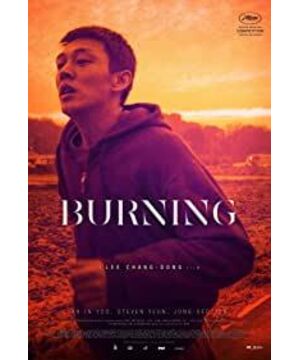Nichts auf der Welt ist keine Methapher.
Everything in the world is a metaphor. This sentence comes from Goethe and was later used by Murakami in "Kafka on the Shore".
1,
This Murakami-style vocabulary is also deliberately taken care of in Li Cangdong's new work "Burning". Along with "Metaphor", there is also "sacrifice". We later learned that the sacrifice here, that is, the abandoned "old warehouse", was used as a metaphor, pointing directly to Huimei, who had no reliable friends and depended on borrowing. A woman who roams the society with odd jobs.
Let's compare Murakami's original work with Li Cangdong's adaptation.
The original is an 8,000-word short story, written with restraint and a lot of blank space. As the protagonist, "I" met her at a wedding. She is 11 years younger than "I", she is 20, I am 31, and I have marry. It is not stated in the novel whether I am a lover with her or an ordinary friend who only sees her once a month. Judging from the sentences in the novel, the latter is more likely. That is, she and I are just friends who we can talk to in ordinary times. We see each other once a month. Later, she travels to Africa, meets a boyfriend, and then disappears.
This is the Murakami-kun before that great work was born, and before the birth of this "Perhaps the greatest work of his creative career", "I" as the protagonist and this society I am still alienated, on the sidelines, and indifferent. No matter how friendly I am with others, or with the society, there is always a distance. In the novel, Emi, who was "my"'s good friend, disappeared. "I" also looked for it, made several calls, went to her dormitory, and left a message. After that, there was still no news, so she gave up her efforts, and it was over.
These are all my efforts.
This is the biggest difference between Murakami's novels and Li Cangdong's works. Or it can be said that Li Cangdong's adaptation of "Burning the Barn" is more in line with Murakami after "Strange Bird". He started to intervene. From detachment to involvement.
This is a very moving point that you can see when you have seen all of Murakami's works and then look back at "Odd Birds".
2,
Let’s talk about some specific adaptations of the movie.
The novel is even more obscure. It does not directly clarify that the burned barn is actually a lonely woman who is outside the society. Just giving a vague exit, she disappeared. Here in the movie, in order to create a more intense dramatic conflict at the end, the age of "I" was changed to a younger age. "I" and Huimei had known each other since childhood, and met when they grew up. After having a sexual relationship, they became fond of each other. relationship of trust.
The biggest change in the film is the addition of a line to "me", describing my father who was caught in a lawsuit, my life as a country farm boy, my experience of being rejected for a job, my mother running away from home, a few days. The first time I called and didn't speak, and then I met again and asked for money. A ruined family of origin.
But what about the addition of this line?
Korean films mostly point to social criticism and thinking. For example, Li Cangdong is very similar to Chen Kaige of our fifth generation. Films must bear a sense of social responsibility and historical mission. sense".
It is estimated that Li Cangdong's film pointing here is also a creative inertia, from "Mint", "Oasis" to "Miryang", none of them are as good. On the other hand, more importantly, it may also take into account the jury, the so-called "film festival film", the social class issue, the necessary elements.
But this feeling is exactly contrary to Murakami's textual feeling. too close to the ground. The film sets a frame and deliberately adds this line, pointing to the criticism of class and society. It is difficult to say whether it is good or bad for Murakami's elegant, swift, flexible, and fantasy text. In South Korea, there are many films that pay attention to social responsibility, but there are relatively few films that can purely produce the textual sense of Murakami.
What kind of text should Li Cangdong’s film match? I think it’s the teacher Yan Lianke, who criticized Murakami as “bitter coffee literature”, and the idea is particularly correct. It seems that this adaptation is much more suitable?
Another one, Li Cangdong originally made a movie, and the rhythm was very slow. Adding this line only made the story more scattered. Therefore, no matter from the consideration of the adaptation of the text itself, the connotation of the conception or the rhythm of the film, I do not think that this line is appropriate.
Of course, Burning itself has something to be commended. The movie adds a lot of details, such as cats, pink watches, and the collection of girls in the toilet in this room. It is very important to leave blank spaces and restraint. In this regard, this movie is more particular, and these all point to the same time in the end. That violent, silent climactic ending.
Hui Mei asked Zhong Xiu to take care of her cat, but she just added cat food and never saw it. Hui Mei said that she fell into a well when she was a child, and Zhong Xiu rescued her, but Zhong Xiu herself could not remember.
Zhong Xiu later asked the landlord again, and the landlord said there had never been a cat.
I asked my neighbors when I was eating noodles, and the neighbors said there was no well. She also said that she is particularly good at making up stories.
Therefore, the film itself is intentionally blurred, including the pantomime that Huimei performed earlier, which also reflects that Huimei is good at fantasy, so whether these are Huimei's fantasy or real. Does the cat really exist? Did she fall into a dry well when she was a child?
But after Huimei disappeared, Zhongxiu asked his mother again, and his mother said that the well really existed.
So it's blurred, to an indeterminate quantum state, and the discussion of reality and fantasy here is a lot like the end of "The Empty Room."
3.
Speaking of quantum states, Ben, Huimei, and Zhong Xiu had a chat under the sunset.
It was here, after the sun set, that Ben told Zhong Xiu that he had a hobby of burning barns. He did not make moral or value judgments. A very quantum-mechanical passage:
"There's no right or wrong there, just natural morality, akin to coexistence." "Coexistence?" "I'm here and there, I'm in Paju and Banpo, in Seoul and in Africa , like that, that kind of equilibrium.”
So this is also linked to the disappearance of Huimei. Zhong Xiu suspected that Huimei was the barn that was burned down, but there was no definite evidence until she saw the cat and called Boil, which was also Huimei's cat's name, and the cat jumped to In his arms, he saw Emi's watch in the collection drawer in the toilet, as if everything was right.
But it doesn't seem so sure? It is also possible that Emi stayed here intentionally or unintentionally, or it just happened to jump over. She gave the watch to Ben, and Emi intentionally disappeared because of escaping debt or other reasons.
When we saw the last Ben was killed, it was also a very shocked and incredible expression.
The ending seems to show a kind of uncertainty, so our judgment at the beginning is not necessarily accurate.
In this movie, everything is judged without hard evidence, including Ben's killing and our judgement. In Murakami's text, this point is more obvious, or rather obscure, while in Li Cangdong's film, a possibility that was covered up is magnified, and class issues are intentionally added, pointing to a more explicit ending.
But the adaptation here, I think, is relatively successful. The novel has more than 8,000 words, which can be vague and obscure, but the movie is different, especially this movie. The foreshadowing and blank space of many details in the front are restrained, and the narrative is compared. Dispersion, more than two hours of waiting, all this is to point to the last climactic ending. This also takes into account the needs of the market and the audience.
"Burning" is two and a half hours. I feel that it is indeed too long. It can be compressed to one and a half hours, which is exactly the length of "Empty Room". Li Cangdong has always dragged the rhythm very slowly in filmmaking, and the narrative is scattered and thin.
At the end, it is a silent climax of bursting and silent, dynamic and contrasting, a bit like the suicide in "Hidden Camera" and Kitano Takeshi's "Hana".
4.
Let's talk about the performance, they are talking about Liu Yaren. I think Steven Yuan's performance is very good. Many of Murakami's works have this kind of role, such as this year's new work, "The Assassination of the Knight Leader" in the "Men Se-kun", speech Slow, gentle and polite, very gentle, decent, clean, decent, wealthy, indifferent, experienced, mansion, good taste in literature, music, art, decoration, Steven plays very well.
Read the novel's description of him:
"He is twenty-seven or eight-year-old, tall, well-dressed, and speaks softly. Although his expressions are not rich enough, his looks are basically pretty, and he doesn't feel bad. He has big hands and long fingers."
It matches the imagery in the movie.
During a meeting in the middle of the novel, Ben grew a beard:
"He was wearing a navy blue light suit, and he felt a little different from when we met before—at least because he had a beard for about two days. Although he didn't shave, he didn't feel sloppy at all, but it was dark. Just a little thicker."
In the movie, there is also this change.
5.
Finally, when I watched "burning" yesterday, I thought of "The Empty Room". The more I thought about it, the more I felt that Kim Ki-duk's "The Empty Room" was a more typical Murakami-style story, unreal or surreal. The short stories with great ideas, the sense of text, are very similar, such as "TV Man", "Sleep", "Vomiting 1979", "The Bakery Again", "Tokyo Strange Tales", etc.
My expectation for the adaptation of Murakami's short story is similar to Kim Ki-deok's "Empty Room", an 8,000-word short story, 90 minutes is enough, it doesn't need to drag so long, and it is so close to the ground.
Elegance, swiftness, agility, vagueness, ambiguity, reality and fantasy are at odds with each other.
However, there are still very few films with this tone. I liked "Empty Room" at the beginning, and then I watched Murakami's short stories. Now that I think about it, I actually like the same category.
View more about Burning reviews











